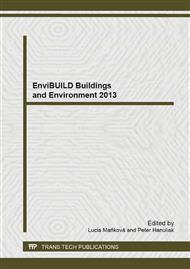p.24
p.30
p.36
p.42
p.46
p.52
p.58
p.62
p.66
Interaction of New Physical-Energy Quantification of Buildings and Renewable Energy Sources as a Dominant Production Technology of Natural Capital
Abstract:
Transition to a sustainable society. Transforming of the energy market. The social value of CO2 emissions. Development of technology in architecture for a sustainable society. Change of the value system in society. The dominant production technology of the capital of nature with simultaneous ecosystem restoring. Renewable energy sources of predictable and unpredictable type. Renewable energy sources as a conditioning factor of fundamental concept changes of energy quantification of buildings. Requirements for physical quantification of buildings with a zero energy balance in relation to energy distribution networks. Green buildings with zero heat balance of the network - buildings with nearly zero energy balance of the network. Sustainable buildings with zero energy balance of the network. Sustainable building with an active energy balance in relation to distribution networks.
Info:
Periodical:
Pages:
46-51
DOI:
Citation:
Online since:
February 2014
Authors:
Price:
Сopyright:
© 2014 Trans Tech Publications Ltd. All Rights Reserved
Share:
Citation:


